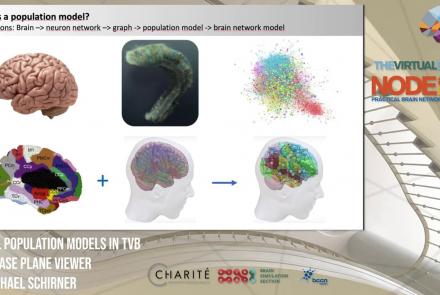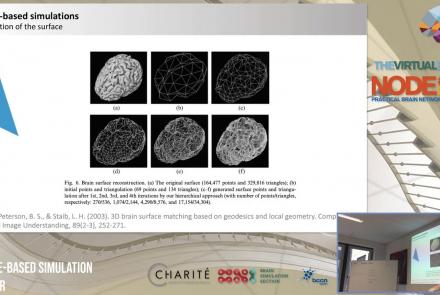Course:
In this lesson, you will learn about the Python project Nipype, an open-source, community-developed initiative under the umbrella of NiPy. Nipype provides a uniform interface to existing neuroimaging software and facilitates interaction between these packages within a single workflow.
Difficulty level: Intermediate
Duration: 1:25:05
Speaker: : Satrajit Ghosh
Course:
This lecture introduces you to the basics of the Amazon Web Services public cloud. It covers the fundamentals of cloud computing and goes through both the motivations and processes involved in moving your research computing to the cloud.
Difficulty level: Intermediate
Duration: 3:09:12
Speaker: : Amanda Tan & Ariel Rokem
This lesson introduces population models and the phase plane, and is part of the The Virtual Brain (TVB) Node 10 Series, a 4-day workshop dedicated to learning about the full brain simulation platform TVB, as well as brain imaging, brain simulation, personalised brain models, and TVB use cases.
Difficulty level: Intermediate
Duration: 1:10:41
Speaker: : Michael Schirner
This tutorial covers how to import appropriate data into The Virtual Brain, as well as how to begin constructing detailed brain models.
Difficulty level: Intermediate
Duration: 23:03
Speaker: : Patrik Bey
In this tutorial, you will learn how to run a typical TVB simulation.
Difficulty level: Intermediate
Duration: 1:29:13
Speaker: : Paul Triebkorn
This lesson introduces TVB-multi-scale extensions and other TVB tools which facilitate modeling and analyses of multi-scale data.
Difficulty level: Intermediate
Duration: 36:10
Speaker: : Dionysios Perdikis
This tutorial introduces The Virtual Mouse Brain (TVMB), walking users through the necessary steps for performing simulation operations on animal brain data.
Difficulty level: Intermediate
Duration: 42:43
Speaker: : Patrik Bey
In this tutorial, you will learn the necessary steps in modeling the brain of one of the most commonly studied animals among non-human primates, the macaque.
Difficulty level: Intermediate
Duration: 1:00:08
Speaker: : Julie Courtiol
This lecture delves into cortical (i.e., surface-based) brain simulations, as well as subcortical (i.e., deep brain) stimulations, covering the definitions, motivations, and implementations of both.
Difficulty level: Intermediate
Duration: 39:05
Speaker: : Jil Meier
This lecture provides an introduction to entropy in general, and multi-scale entropy (MSE) in particular, highlighting the potential clinical applications of the latter.
Difficulty level: Intermediate
Duration: 39:05
Speaker: : Jil Meier
This lecture gives an overview of how to prepare and preprocess neuroimaging (EEG/MEG) data for use in TVB.
Difficulty level: Intermediate
Duration: 1:40:52
Speaker: : Paul Triebkorn
In this lecture, you will learn about various neuroinformatic resources which allow for 3D reconstruction of brain models.
Difficulty level: Intermediate
Duration: 1:36:57
Speaker: : Michael Schirner
This lecture provides an general introduction to epilepsy, as well as why and how TVB can prove useful in building and testing epileptic models.
Difficulty level: Intermediate
Duration: 37:12
Speaker: : Julie Courtiol
This lesson provides an overview of The Virtual Brain integrated workflows on EBRAINS.
Difficulty level: Intermediate
Duration: 32:21
Speaker: : Petra Ritter
This lesson walks users through the Image Processing Pipeline, an integral part of the TVB on EBRAINS integrated workflows.
Difficulty level: Intermediate
Duration: 24:31
Speaker: : Michael Schirner
This lesson gives an overview of The Virtual Brain simulator and its integration into the Human Brain Project Cloud and EBRAINS infrastructure.
Difficulty level: Intermediate
Duration: 24:55
Speaker: : Lia Domide
In this lesson, users will get an overview of the EBRAINS integrated Fast TVB, a C implementation of TVB that is orders of magnitude faster than the original Python TVB, and capable of performing parallelizable simulations in the cloud.
Difficulty level: Intermediate
Duration: 8:38
Speaker: : Michael Schirner
This lesson gives a brief overview of the multi-scale co-simulation between TVB-NEST and Elephant on the EBRAINS infrastructure.
Difficulty level: Intermediate
Duration: 6:05
Speaker: : Wouter Klijn
In this lesson, you will learn about the process of constructing models for TVB automatically on the EBRAINS infrastructure.
Difficulty level: Intermediate
Duration: 23:11
Speaker: : Michiel Van der Vlag and Sandra Diaz
Course:
This lecture covers the rationale for developing the DAQCORD, a framework for the design, documentation, and reporting of data curation methods in order to advance the scientific rigour, reproducibility, and analysis of data.
Difficulty level: Intermediate
Duration: 17:08
Speaker: : Ari Ercole
Topics
- Clinical neuroinformatics (5)
- (-) Standards and Best Practices (1)
- (-) Machine learning (6)
- (-) Neuroimaging (5)
- EBRAINS RI (2)
- Neuromorphic engineering (1)
- Standards and best practices (8)
- (-) Tools (11)
- (-) Workflows (4)
- Animal models (1)
- Brain-hardware interfaces (1)
- Clinical neuroscience (2)
- General neuroscience (3)
- (-) Computational neuroscience (26)
- Statistics (2)
- Computer Science (2)
- Genomics (5)
- Data science (4)
- (-) Open science (4)
- Project management (1)




















